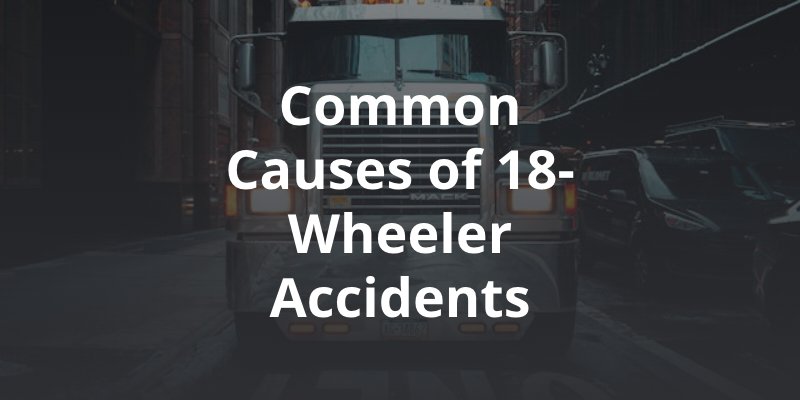
Every year, thousands of individuals lose their lives in traffic accidents involving 18-wheelers or semi-trucks. In Texas, truck accident victims can receive financial compensation from the person or party at fault for the collision. Identifying the most common causes of large truck accidents can help you understand your rights as an injured victim. If you’ve been involved in a truck accident, an Austin personal injury lawyer can help you pursue the compensation you deserve and guide you through the legal process.
Truck Driver Fatigue
Truck driver fatigue is a significant problem in the trucking industry – so much so that a special federal law has been passed to help prevent it, known as hours of service (HOS). Under this rule, no truck driver may drive more than 11 hours after 10 consecutive hours off duty, with a 14-hour total limit after coming on-duty.
Managing drowsiness and fatigue is a vital issue among truck drivers due to the pressures of their jobs. Truck drivers are required to drive for long hours on the road alone, often overnight. In addition, as many as 28 percent of truck drivers suffer from sleep apnea – a medical condition that interrupts sleep and causes fatigue during the day.
Distracted Driving
Like all motor vehicle drivers, truck drivers are apt to make the dangerous mistake of driving while distracted. Truckers are especially prone to distraction due to the tedious nature of their jobs.
To help pass the time, truck drivers may use a cell phone, watch videos, eat and drink, read, engage in personal grooming, and participate in other distracting activities. A distracted truck driver may not notice a changing roadway situation in time to avoid a collision.
Driving While Intoxicated
If a truck driver is guilty of driving under the influence of drugs or alcohol, he or she may be unable to control the big rig. Operating a commercial truck takes a high level of skill, care and ability. Even slight intoxication can compromise a truck driver’s ability to drive the truck. This is why there are strict federal laws prohibiting intoxication.
According to the Federal Motor Carrier Safety Administration (FMCSA), in 2019 – the most recent year data is available – 3.1 percent of truck drivers involved in fatal accidents had a detectable blood alcohol content (BAC) level (around 153 drivers). The legal BAC for commercial drivers in Texas is 0.04 percent.
Broken Traffic Laws
A truck driver who is in a hurry or engaging in careless or reckless driving practices may violate one or more traffic laws, increasing the odds of an 18-wheeler accident. Commonly broken laws include speeding, tailgating or following too closely, ignoring traffic signals, running red lights, making unsafe lane changes, illegally passing, failing to yield the right-of-way, and reckless driving.
Violated Federal Laws
Truck drivers and trucking companies are required to abide by special federal regulations in addition to standard traffic laws and state statutes in Texas. These laws include:
- Hours-of-service restrictions
- Truck maintenance and daily inspection requirements
- Electronic logging devices and recordkeeping obligations
- Commercial driver’s license requirements
- Driver health and medical requirements
- Mandatory drug and alcohol testing
- Truck weight and size limits
- Cargo loading and securement rules
- Hazardous materials regulations
Unfortunately, trucking companies are known for violating federal laws in an effort to save time and money – enhancing the odds of a truck accident.
Poor Truck Driver Training
As part of their safety obligations, all trucking companies in Texas must comply with the appropriate truck driver hiring and training procedures to ensure a safe staff. Hiring unqualified or poorly trained drivers can lead to reckless truck operation.
An inadequately trained driver may lack critical knowledge on how to handle and control the 18-wheeler, such as how to check for blind spots or bring the truck to a safe stop. Untrained truckers are also more likely to break safety laws, such as exceeding their hours-of-service limits.
Inadequate Truck Maintenance
The upkeep of a large truck is vital for ensuring that it operates and gets to its destination safely. A company’s failure to properly maintain its fleet of trucks can lead to dangerous mechanical failures, such as tire blowouts and bad brakes. This endangers everyone else on the road.
Trucking companies have inspection, repair, and maintenance requirements for all commercial motor vehicles under their control. Companies and their drivers should perform thorough inspections before each drive. If necessary, the company should pull the truck and have it repaired before allowing it back on the road.
Defective Parts
An 18-wheeler is only as safe as its parts. If even one part of a large truck contains a defect, it can make the truck unsafe or unstable to operate. This can ultimately lead to a serious truck accident. If the truck or one of its parts contains a design, manufacturing or marketing flaw, the manufacturer or distributor could be held responsible.
Cargo Problems
Issues with a large truck’s cargo can lead to dangerous situations, including truck instability, rollover accidents and lost cargo loads. The parties responsible for loading and securing cargo onto a semi-truck must do so according to federal cargo securement laws, including maximum truck weight limits. Otherwise, the cargo may shift in transit or fall off the truck onto the road, creating a significant hazard.
Dangerous Road Conditions
Dangerous road conditions in Texas can be a significant contributing factor to trucking accidents. A road defect such as a pothole or dangerous construction zone could adversely affect a truck’s handling, stability and ability to brake. This can lead to the truck driver losing control of the vehicle and crashing.
Who Can Be Held Liable for an 18-Wheeler Accident in Texas?
Determining who is liable, or financially responsible, for your 18-wheeler accident requires understanding who is at fault for the wreck. Texas uses an “at-fault” car insurance law, where the person or party at fault for a traffic accident pays for a victim’s losses.
A large truck accident, unlike a standard car accident, involves more than just two motor vehicle drivers. These cases also include a trucking company or employer, a cargo company or loader, maintenance personnel, a truck manufacturer, other drivers, and government entities.
Identifying the at-fault party or parties typically requires an investigation of the accident. An experienced truck accident lawyer can investigate your crash to determine its cause. Then, your attorney can gather evidence and hire experts, as needed, to prove liability and achieve the best possible case result.
To discuss a recent truck accident in Austin with a knowledgeable attorney, contact FVF Law Firm for a free and no-pressure consultation. Our lawyers have over 100 years of combined experience in personal injury law.








